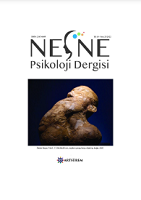Travma Sonrası Değişim Ölçeği: Türkçe Uyarlama, Geçerlik-Güvenirlik Çalışması
The Posttraumatic Change Scale: Turkish Adaptation, Validity and Reliability
Author(s): Hikmet Yazıcı, Münevver Özdemir, Elif Özlem Ardıç KemerkayaSubject(s): Psychology, Methodology and research technology
Published by: Sanat ve Dil Araştırmaları Enstitüsü
Keywords: Traumatic event; Posttraumatic Change Scale; validity; reliability;
Summary/Abstract: The main purpose of this study was to adapt the Post Traumatic Change Scale (PTCS) developed by Nordstrand and collegues (2017) into Turkish and to examine its psychometric properties. The research group was consisted of 253 adult who have at least one traumatic experience. The data were collected Posttraumatic Change Scale, Life Events Checklist for DSM-5 (LEC-5), Post-Traumatic Stress Disorder Checklist-5 (PCL-5), Posttraumatic Growth Inventory (PTGI). Criterion-related validity, confirmatory factor analysis were used for the validity of Turkish form of scale while the reliability of the Turkish form of the scale was examined with the Cronbach α coefficient. The confirmatory factor analysis results of the four-factor structure indicated that the model was compatible with the data (χ2 (293) = 506.436, S-Bχ2/sd= 1.73, GFI=.946, AGFI=.935, CFI= .962, TLI=.957 ve RMSEA=.05). As a result of the analysis, it was found that the discrimination value of all items was above 0.30. Cronbach α reliability coefficient was calculated as .91 for the combined scale and over .70 for the subscales. It was found that Posttraumatic Change Scale and its subscales has significant positive relationship with the total scores of Posttraumatic Growth Inventory. The results of this study showed that the Turkish form of Posttraumatic Change Scale may be used as a valid and reliable instrument in determining posttraumatic change.
Journal: Nesne-Psikoloji Dergisi
- Issue Year: 10/2022
- Issue No: 23
- Page Range: 32-44
- Page Count: 13
- Language: Turkish

